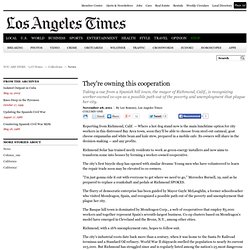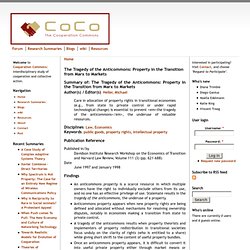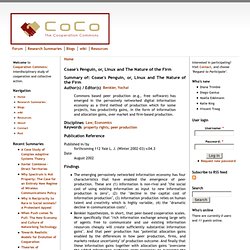

COLUMN ONE: They're owning this cooperation. Reporting from Richmond, Calif. — Where a hot dog stand now is the main lunchtime option for city workers in this distressed Bay Area town, soon they'll be able to choose from steel-cut oatmeal, goat cheese empanadas and white bean and kale stew, prepared in a mobile cafe.

Its owners will share in the decision-making — and any profits. Richmond Solar has trained needy residents to work as green-energy installers and now aims to transform some into bosses by forming a worker-owned cooperative. The city's first bicycle shop has opened with similar dreams: Young men who have volunteered to learn the repair trade soon may be elevated to co-owners.
"I'm just gonna ride it out with everyone to get where we need to go," Mercedes Burnell, 19, said as he prepared to replace a crankshaft and pedals at Richmond SPOKES. The Basque hill town is dominated by Mondragon Corp., a web of cooperatives that employ 83,000 workers and together represent Spain's seventh-largest business. The Tragedy of the Anticommons: Property in the Transition from Marx to Markets. Anticommons property is defined to be a class of property in analogy to the commons in classical economic literature to explain some of the failures and difficulties in the transition from communist to market economies.

Multiple owners have privileges in a resource in a commons. The overuse of that resource has been described, notably by Hardin, as the tragedy of the commons. Heller defines an anticommons property as a scarce resource in which multiple owners have the right to individually exclude others from its use, and no one has an effective privilege of use. Stalemate results in the , the underuse of a property.
Heller examines a paradox in Moscow after the dissolution of the Soviet Union. Coase's Penguin, or, Linux and The Nature of the Firm. The traditional framework of the organization of economic production includes two modes of production: individuals order their productive activities either under the direction of managers at firms, or as individuals in markets following price signals.

Free Software is one example of a broader social-economic phenomenon that Benkler calls 'commons-based peer production', a new, third mode of production in digitally networked environments. In order to explain the emergence of this third mode of production Benkler augments the traditional production framework. Because of the highly variable nature of human expertise, and given a pervasively networked information economy, commons-based peer production has advantages over the two traditional forms of organization. The paper concludes with a discussion of the problems of motivation, loss of motivation, and integration in peer production enterprises.